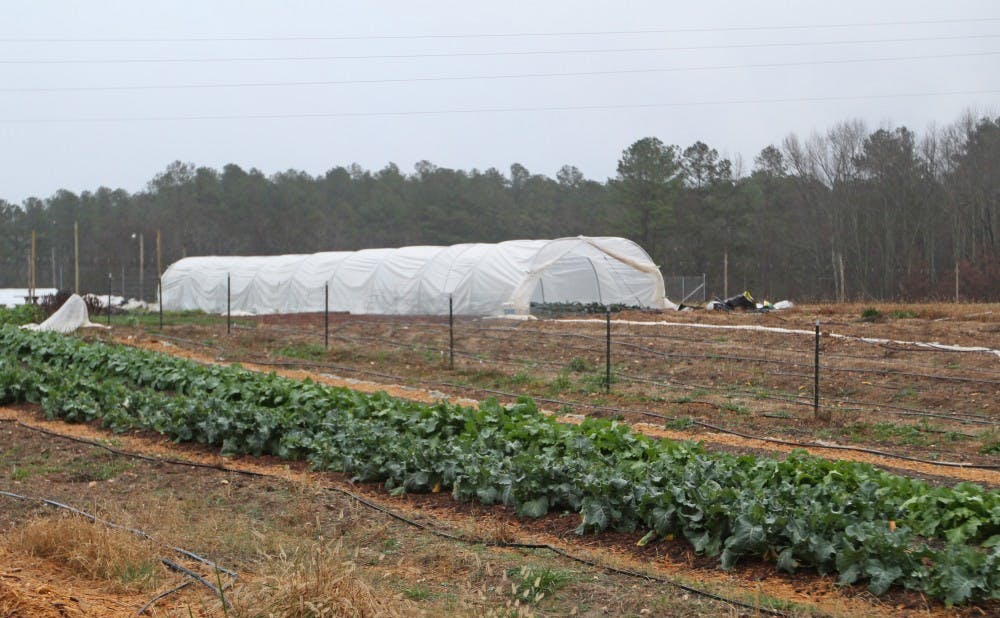Farmers and consumers both locally and nationally are voicing concerns over the upcoming implementation of the Food Safety Modernization Act.
The act, which was passed in 2010 by Congress and signed into law by President Barack Obama in 2011, contains a major food safety reform laws regulated by the Food and Drug Administration. The act aims to increase safety for the growing and processing of fruits and vegetables, but many farms and sustainability activists are criticizing the changes for punishing farmers who use sustainable and organic methods.
The Duke Campus Farm is one of the food producers that would be affected by the changes. Campus Farm manager Emily Sloss noted specifically the changes to compost procedures that the law ushers in and the harm this would cause to the Campus Farm.
Under the law, farmers must leave compost that minimizes contact with produce—which the Campus Farm uses for its produce—on land for a minimum of 45 days before the plants are harvested, or use compost that has been chemically treated.
“You would be penalized by growing food organically, when it should give more incentive to go without chemicals,” Sloss said.
The Campus Farm produces vegetables such as cabbages and radishes that remain in the ground for much shorter time period than the new requirement stipulates, and Sloss said that produce such as microgreens would take as little as 10 days to produce. The legislation would require the Campus Farm to put the compost on fields for an extended period before planting, limiting the amount of land they could use.
“It would make a lot of our land unusable for parts of the year,” Sloss said. “It would decrease our productivity.”
The law also states that farmers will be required to “wait an adequate amount of time between grazing and harvesting… to ensure the safety of the harvested crop” after animals may have contaminated the produce. It also requires farms to implement preventative measures against hazards brought by working animals such as draft horses and to monitor before and during the growing season for animal intrusion—all to prevent pathogens from being transmitted onto fruits and vegetables through animal feces.
Sloss called these conservation expectations unrealistic, noting that the presence of the Duke Forest is a natural habitat for small rodents and other mammals that are beneficial to the ecosystem. She argued that the law could be harmful not only to the farms but also to the areas surrounding them.
“We don’t want these rules to encourage people to try to get rid of these natural wildlife areas,” she said.
Sloss also noted that the cost involved with adapting to the new regulations is also a point of contention.
According to a National Sustainable Agriculture Coalition web fact sheet, the costs for compliance for a very small farm would be about six percent of average annual gross sales, or $4,697. For a small farm, the cost would be $12,972 per year, or four percent of gross sales, and for a large farm $30,566 or one percent.
“The regulations and costs that would go into enforcing this to be certified—it would be crazy. It would be so much to enforce all of this,” she said. “As it is now, we don’t have to be certified by any third party. Once you have that it gets expensive very quickly.”
The critiques of the legislation by farmers such as Sloss will not be lost, however, the FDA is accepting comments and suggestions until Friday.
Sarah Hackney, grassroots director for the National Sustainable Agriculture Coalition, said the organization is working to funnel those comments through to the FDA before the deadline. A team of farmers, researchers and analysts have been parsing the rules since January, Hackney said, to evaluate the impact the rules would have on farms.
“Our comments are heavily influenced by farmers. We by no means can speak for everyone,” Hackney said.
She said the coalition has been in touch with the FDA extensively to provide perspective from farmers directly, and she said the FDA has been “reasonably” receptive, though they “really do want to hear from folks.” The priorities they are emphasizing are to allow farmers to continue to use sustainable farming practices, to avoid stifling or targeting innovative efforts and to treat farms fairly with due process in enforcing the rules.
Farms such as the one on Duke’s campus, she said, are relatively small and may not have been considered when the law was written by the agency. Thus it is even more critical that similar farms respond through the NSAC to explain why the new rules will not benefit them.
“That’s part of being an engaged citizen,” Hackney said. “You have a say in how the federal government develops rules.
Get The Chronicle straight to your inbox
Signup for our weekly newsletter. Cancel at any time.

